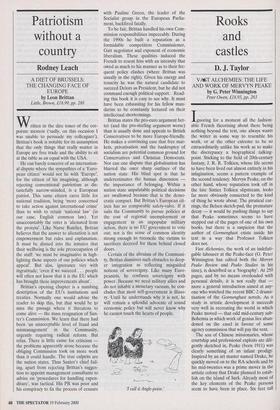Patriotism without a country
Rodney Leach
A DIET OF BRUSSELS: THE CHANGING FACE OF EUROPE by Leon Brittan Little, Brown, £18.99, pp. 288 Written in the dire tones of the cor- porate memoir (`sadly, on this occasion I was unable to persuade my colleagues'), Brittan's book is notable for its assumption that the only things that really matter in Europe are free trade and the ability to sit at the table as an equal with the USA.
He can barely conceive of an internation- al dispute where the sympathies of a 'Euro- pean citizen' would not lie with 'Europe', for the citizen of his imagining, although rejecting conventional patriotism as dis- tastefully narrow-minded, is a European patriot. This same citizen cares little for national tradition, being 'more concerned to take action against international crime' than to wish to retain 'national law' (in our case, English common law). Yet unaccountably the voter is 'alienated from the process'. Like Nurse Ratchet, Brittan believes that the answer to alienation is not empowerment but rules and explanation. It must be dinned into the inmates that their wellbeing is the sole preoccupation of the staff: 'we must be imaginative in high- lighting those aspects of our policies which appeal'. But alas, ignorance vies with ingratitude: 'even if we succeed . . people will often not know that it is the EU which has brought these improvements about'.
Brittan's opening chapter is a numbing description of the EU's institutions and treaties. Normally one would advise the reader to skip this, but that would be to miss the passage where it threatens to come alive — the mass resignation of San- ter's Commission. We learn that there had been 'an unacceptable level of fraud and mismanagement' in the Community, urgently requiring radical reform. But relax. There is little cause for criticism the problems apparently arose because the obliging Commission took on more work than it could handle. The true culprits are the nation states. Thus Santer's chief fail- ing, apart from rejecting Brittan's sugges- tion to appoint management consultants to advise on 'procedures for handling expen- diture', was tactical. His PR was poor and his conspiracy to fix the process of censure with Pauline Green, the leader of the Socialist group in the European Parlia- ment, backfired fatally.
To be fair, Brittan handled his own Com- mission responsibilities impeccably. During the 1990s he built a reputation as a formidable competition Commissioner, Gatt negotiator and exponent of economic liberalism. These qualities induced the French to resent him with an intensity that owed as much to his manner as to their fre- quent policy clashes (where Brittan was usually in the right). Given his energy and tenacity he was the natural candidate to succeed Delors as President, but he did not command enough political support. Read- ing this book it is easy to see why. It must have been exhausting for his fellow man- darins to be constantly lectured on their intellectual shortcomings.
Brittan states the pro-euro argument bet- ter (and the pro-sterling argument worse) than is usually done and appeals to British Conservatives to he more Europe-friendly. He makes a convincing case that free mar- kets, privatisation and the bankruptcy of socialism are potential common ground for Conservatives and Christian Democrats. Nor can one dispute that globalisation has blurred the once sharp outlines of the nation state. His blind spot is that he underestimates the human dimension the importance of belonging. Within a nation state unpalatable political decisions are swallowed because• that is the demo- cratic compact. But Brittan's European cit- izen has no comparable safety-valve. If it suits the Community to pursue policies at the cost of regional unemployment or engagement in an unpopular military action, there is no EU government to vote out; nor is the sense of common identity strong enough to reconcile the victims to sacrifices decreed for them behind closed doors.
Certain of the altruism of the Communi- ty, Brittan dismisses such obstacles to deep- er integration as reflecting misguided notions of sovereignty. Like many Euro- peanists, he confuses sovereignty with power. Because we need military allies and do not inhabit a monetary vacuum, he con- cludes that most self-government is illuso- ry. Until he understands why it is not, he will remain a splendid advocate of sound economic policy but will never know why he cannot touch the hearts of people.
`I call it Angle-poise.'


































































 Previous page
Previous page